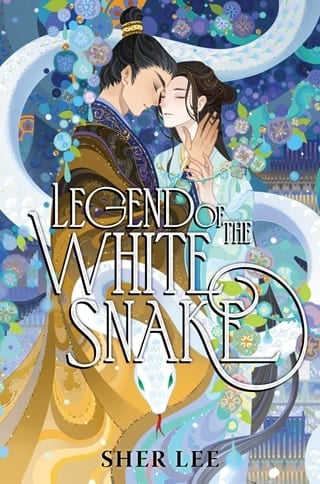Chapter 6
XIAN
According to ancient books of rites, an emperor or king rode in a carriage drawn by six horses, while a prince rode with four.
But Xian refused the carriage and insisted on riding Zhaoye. He didn't care about tradition. His goal was to reach Changle
as soon as possible.
Xian set out at daybreak, accompanied by Fahai, Feng, and the rest of his delegation. He hadn't set foot in the capital of
Min since the smaller kingdom declared allegiance to Wuyue. Last year, Xian's father spent two weeks visiting the palace in
Changle; he had brought his royal entourage, including his wife, consorts, princes, and princesses. But Xian had chosen to
stay behind. He wouldn't leave his mother alone just to have a good time.
In the middle of their journey, they arrived at a way station and were told by scouts who had gone ahead that fallen trees were blocking the main road. The horses could pass but not the wagons laden with gold, jade, and silk. Workers would take a day or two to remove the debris.
"We'll split the delegation," Xian said. "Fahai and I will go ahead. Feng and the guards will stay behind with the wagons
until the road is cleared."
Fahai nodded. He understood the urgency of their true errand. Feng, who also knew the real reason they were going to Changle,
was unable to hide his misgivings.
"I'm supposed to be your bodyguard," Feng said early the next morning as he helped Xian put on his armor in his room. "No
offense to Fahai, but he's trained in court affairs, not martial arts."
"I'm sure Fahai can punch any attackers with his scholarly fists and whack them in the face with his fish pouch," Xian replied,
taking his helmet from Feng. It was made of lamellar metal trimmed with leather and had yellow plumage to distinguish him
from the other cavalry.
Feng shot him a withering look as he secured Xian's overlapping breastplates to his torso with toughened laces. "I'm not joking.
How can he defend you if anything happens?"
General Jian had begun teaching his firstborn son martial arts when he was a child; by the time Feng was ten, he was so skilled
that he was sent to Shaolin Monastery for three years to learn from the world-renowned masters there.
"You and Fahai are the two I trust most." Xian adjusted the metal greaves that extended from his belt to his knees. "I need one of you to stay behind with the valuables and make sure nothing goes missing. You know the guards your father picked for this journey better than I do. They'll obey your command."
Outside, Zhaoye neighed and stomped his feet.
"Rong got food poisoning last night and will have to stay behind," Feng said. Rong was Zhaoye's keeper. "Your horse won't
let anyone but you and Rong put on his armor, so you'll have to do it yourself."
Zhaoye still wasn't happy when Xian fastened the plate armor to his head and face. Xian leaned forward and rubbed his neck.
"Yeah, you and me both."
Xian and Fahai set off at first light with a small entourage of two scouts, five guards, and a packhorse carrying the supplies
they needed. Traveling without wagons allowed them to cover more ground. Ferghana horses excelled at endurance riding and
had to drink water only once a day even in the sweltering heat of summer. Zhaoye rode like fire scorching a narrow canyon,
spurring the other horses to increase their pace to keep up.
The rest of the journey passed without incident, and Xian sent the scouts ahead to announce he would be arriving at Changle
a day earlier than anticipated.
The capital was decorated ostentatiously for his royal visit. The streets were lined with lanterns and banners painted with blessings for the prince of Wuyue, and people thronged the road to the palace, playing flutes and cheering. But as Xian rode through the city, he noticed the sparse trees had brittle bark and low-slung branches that bore small fruit or none. The kingdom of Min had been faltering at the end of a drawn-out conflict with Southern Tang—which was what had prompted its capitulation to Wuyue—and the austerity was visible beneath the gold banners and red-lettered glamour.
As at the palace back in Xifu, the sprawling outer court was where official ceremonies were held. Festive celebrations and
victory parades took place there, as well as public punishments. As was the custom, no trees were planted nearby, as they
would overshadow the majesty of the king's presence—and provide a hidden vantage point for an assassin.
Guards saluted as Xian and Fahai dismounted, and stable hands quickly took their horses. An impeccably attired man approached,
bowed deeply, and introduced himself as Governor Gao.
"The rest of my delegation has been delayed by the impassable road, but my adviser and I rode ahead, so we are here a day
earlier than expected," Xian said. "The welcome banquet can proceed tomorrow as planned. The gifts we have brought will have
arrived by then."
Gao bowed again. "The Min court appreciates the prince of Wuyue's kind consideration, but for an auspicious start to the visit,
we as hosts must hold the welcoming festivities on the day of Your Highness's arrival. We request that you and your counselor
grace us with your presence at the banquet this evening. The royal manor has been prepared for you and your entourage."
All palaces were constructed along the same south–north axis; the buildings on either side of the central line were built with painstaking precision to ensure each half was symmetrical, and the left was always given more honor than the right. A vast gate with five archways separated the inner and outer courts. Two stone lions flanked the center archway, which could be used only by the king. Gao respectfully gestured Xian toward the archway on the left, which was reserved for the royal family. The other officials, including Gao and Fahai, entered through the archway on the right.
The royal manor stood in a guarded compound with high walls on all four sides. The main building, with its yellow-glazed roof
crowned with carved dragons and double eaves that curved outward and upward, was at the north; the vermilion entrance gate
faced south.
The bedroom arranged for Xian was second only to the king's chamber—it was traditionally occupied by the crown prince. Xian
couldn't suppress a smirk as he imagined Wang's chagrin. The room was so spacious that he and Feng could probably have had
a sparring session if they shifted a few pieces of furniture aside. The platform bed was as wide as it was long, elegantly
framed with gauze curtains and pennants. On the elaborately carved wooden dresser stood an incense clock, minutes and hours
calibrated by incense sticks. To the left, a set of doors connected to an adjoining room, which was where his bodyguard would
sleep.
In the corner of the chamber was something Xian didn't have in his room back home: a gold lacquered bathtub. Bathing was ritualistic, meant to cleanse body and soul; priests and even the king himself had to bathe before offering sacrifices or performing rites. This gilded bathtub, however, was clearly made for pleasure rather than piousness.
But nothing was quite as blatant as the small ceramic bottle placed by the side of the bed. Xian didn't need to remove the
stopper to know what the contents were meant for.
A good-looking boy around his age had quietly followed Xian into his chamber. He stepped forward and bowed low. "Will Your
Highness allow his humble servant the honor of assisting him in removing his armor?"
Feng was usually the one in charge of this task, but he wasn't there. Xian extended his arms, and the boy skillfully unknotted
the ties holding the pieces of armor together and hung them all on a wooden rack. Then he filled a copper basin with clean
water for Xian to wash his face and hands.
"What's your name?" Xian asked.
"My name is Deng, Your Highness. I am the most senior among the courtesans under the age of eighteen."
A courtesan. It explained why he was faultless not just in his duties but in his expressions. On any other occasion, Xian
would've let himself indulge. This was the first time he had been away from home on his own—he didn't even have to sneak out
for a roll in bed with an attractive boy.
But the reason he was here was too important. He couldn't allow himself to be distracted.
"I can take it from here, Deng," Xian said. "You may leave."
Deng couldn't hide his surprise at the abrupt dismissal. He retreated and closed the doors behind him, leaving Xian alone in the vast room.
Xian washed his face with water from the copper basin, rinsing away the grime and sweat from a long day of riding. He opened
his luggage and took out his golden-yellow lóng páo for the banquet. Its dark blue satin collar and cuffs were hemmed with gold thread; embroidered on the front of the garment
were five-clawed dragons, embellished with thousands of tiny freshwater seed pearls, as well as motifs of cloud scrolls, medallions,
and crashing waves.
Xian released his long hair from its bun, combed the locks, and twisted them in a loose knot. He would tie his hair properly
before the banquet. He shrugged on a comfortable white robe with green trim and a matching sash. As he adjusted the cross
collar, his fingers brushed the jade amulet hidden beneath his inner shirt.
A wistful smile curled on Xian's mouth. When his mother was finally cured and well enough to travel, he would ask permission
from his father to take her to the small palace in the eastern court of Yuezhou to recuperate. The character 東 —east—was made up of 日 , the sun, and 木 , a tree. Both elements represented spring—a time for growth, for new beginnings to take root. Being back east, close to her
hometown, would be good for his mother's recovery.
A large bowl of fresh fruit sat on the table. The apricots were exceptionally fragrant, and Xian slipped two into his pocket before heading out of the chamber.
The guards outside saluted as he passed. If they were bemused at his informal outfit, they had been trained not to show any
reaction. Beyond the walls of the royal manor, no one cast a second glance at Xian. The prince of Wuyue, as far as everyone
was concerned, wore a plumed helmet and full ceremonial armor wherever he went, probably even the bathroom.
Instead of going to the Ancestral Temple, where royals offered sacrifices to their ancestors and bowed before their memorial
tablets, Xian made his way to the Spirit Hall, where the commoners who worked in the palace worshipped. Most Daoist temples
were built entirely with timber and without the use of a single nail; interlocking wooden brackets ingeniously transferred
the weight of the overhanging roof to vertical columns.
The uneven stone steps leading up to the Spirit Hall had been weathered by years of pilgrims' feet. The temple had three doors.
By the door on the right was a statue of a dragon, while a tiger statue stood by the one on the left. The middle doorway was
for spirits, not humans.
Xian walked through the dragon doorway on the right, making sure he crossed the threshold with his left foot first. He would
later exit through the tiger doorway with his right foot first. His mother always reminded him to step over, never on, the
red wooden plank across the bottom of each door that blocked evil from entering the temple.
At that hour in the late afternoon, the temple was empty. The walls were covered in stelae of human figures among a menagerie of beasts and birds; images of deities were carved onto the pillars. Unlike his parents, Xian had never been religious. The rituals he performed at the Ancestral Temple each year were perfunctory, and while the priests chanted lengthy prayers, his mind would drift to how he would sneak out to meet the latest boy who had caught his eye.
Xian halted in front of a statue of Guan Yin, the goddess of mercy and his mother's most beloved deity. On the altar were
an oil lamp, two candles, a porcelain incense burner, and three small cups. The cup on the right contained tea, the left one
was filled with water, and the one in the middle held grains of uncooked rice. Tea represented yin, water symbolized yang,
and uncooked rice was the union between the two.
Xian took three incense sticks—always offered in uneven numbers—and lit them with the flame from one of the candles. He knelt
in front of the altar, shut his eyes, and inhaled deeply, letting the earthy scent of the incense fill his lungs.
"Prince of Wuyue."
Xian opened his eyes as the priest emerged from the inner shrine. He had a black satin hat with a round hard brim on his shaven
head. He was dressed in a dào páo , a wide-sleeved, crossed-collar robe that Daoist priests wore to tend to their daily duties in the temple.
The priest walked toward Xian. "I'm surprised to see you here, Prince of Wuyue, instead of at the Ancestral Temple."
"Dao Zhang." Xian bowed his head as he uttered the respectful title. "My mother is a commoner, and she grew up worshipping
in temples like these."
The priest nodded solemnly. "The gods look with favor on your filial piety. Concealed danger lurks nearby, but you have been blessed with protection from your mother's amulet."
The jade amulet, hidden behind the folds of Xian's robe, suddenly felt warm against his skin. Perhaps the priest was able
to sense its protective aura.
"My mother has been ill for many years." Tendrils of smoke from the incense sticks clasped between Xian's palms continued
to rise, curling heavenward before vanishing. "My father, the king of Wuyue, sought the wisdom of the oracle of Emei, who
directed us to Changle to find a cure. I have come here today to petition for further direction from the gods."
The priest gestured toward a wall at the far side of the room. "Since you have offered incense, we shall now ask for guidance."
Qiú qiān was a common practice in temples throughout the land. The wall was made up of rows of bricks numbered from one to a hundred,
each with a circular hole about an inch in diameter that contained a small rolled-up scroll. The priest handed Xian a hollow
bamboo cylinder filled with flat sticks, each painted red on one end and inscribed with a number that corresponded with one
of the bricks.
Xian tipped the cylinder slightly downward and shook it until one stick jumped out and landed on the floor. He leaned down,
picked up the stick, and held it out to the priest with both hands. The priest looked at the number on the stick, withdrew
a small scroll from one of the bricks, and gave it to Xian.
Xian's heartbeat quickened as he unfurled the parchment, revealing the words written in tiny, slanted lettering: 強龍難壓地頭蛇 .
"?‘ Qiáng lóng nán yā dì tóu shé ,'?" he read out in a quiet tone. Even a powerful dragon struggles to overcome a snake in its native haunt.
Yet another reference to the white snake. But what did it mean? Was it a warning that he, as a prince and the king's emissary—represented
by the dragon—was still an outsider in Changle, while the white snake was in its natural element?
The priest must have noticed the contemplative look on Xian's face.
"The answer will reveal itself at the right time," he said. "May heavenly blessings be with you."
Xian bowed low. "Thank you, Dao Zhang."
He turned to leave, making sure he stepped over the red plank of the tiger door with his right foot.
 Fullepub
Fullepub 



